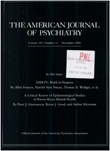The definition of a psychiatrist: eight years later
Abstract
In 1980, psychiatric practitioners and educators were surveyed to determine their concepts of the knowledge and skills that define a specialist in psychiatry. The authors repeated this survey, expanding the list of skill and knowledge items and asking respondents to comment on whether particular skills or knowledge were important to a psychiatric subspecialty. Less importance was ascribed in the current survey than in the earlier survey to certain long-term and social psychotherapies, and more importance was ascribed to descriptive or biological psychiatry; brief or supportive therapies; psychopharmacological agents; consultation-liaison psychiatry; evaluation of children, the aged, and alcoholics; and certain desirable personal characteristics of the psychiatrist.
Access content
To read the fulltext, please use one of the options below to sign in or purchase access.- Personal login
- Institutional Login
- Sign in via OpenAthens
- Register for access
-
Please login/register if you wish to pair your device and check access availability.
Not a subscriber?
PsychiatryOnline subscription options offer access to the DSM-5 library, books, journals, CME, and patient resources. This all-in-one virtual library provides psychiatrists and mental health professionals with key resources for diagnosis, treatment, research, and professional development.
Need more help? PsychiatryOnline Customer Service may be reached by emailing [email protected] or by calling 800-368-5777 (in the U.S.) or 703-907-7322 (outside the U.S.).



